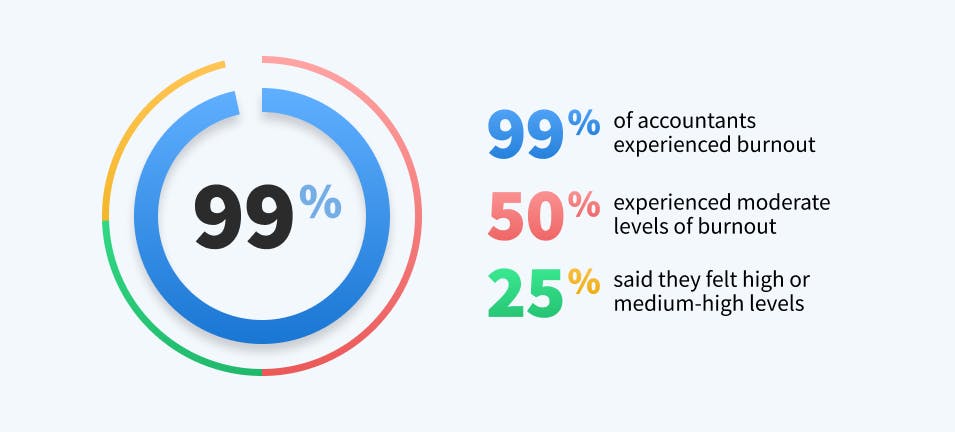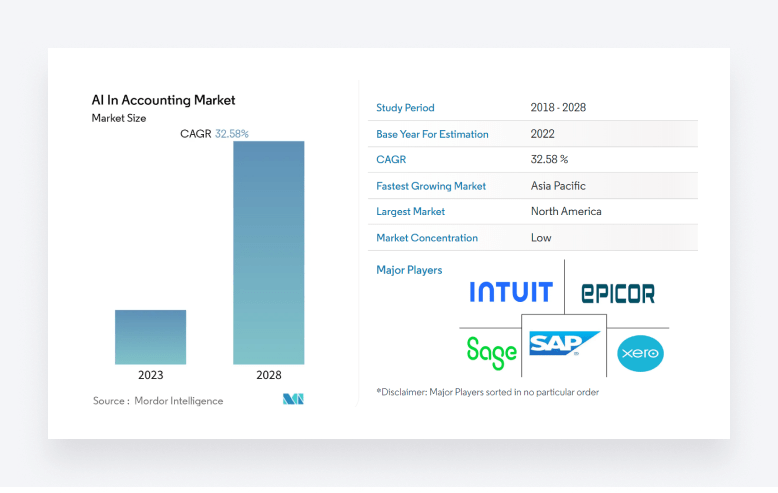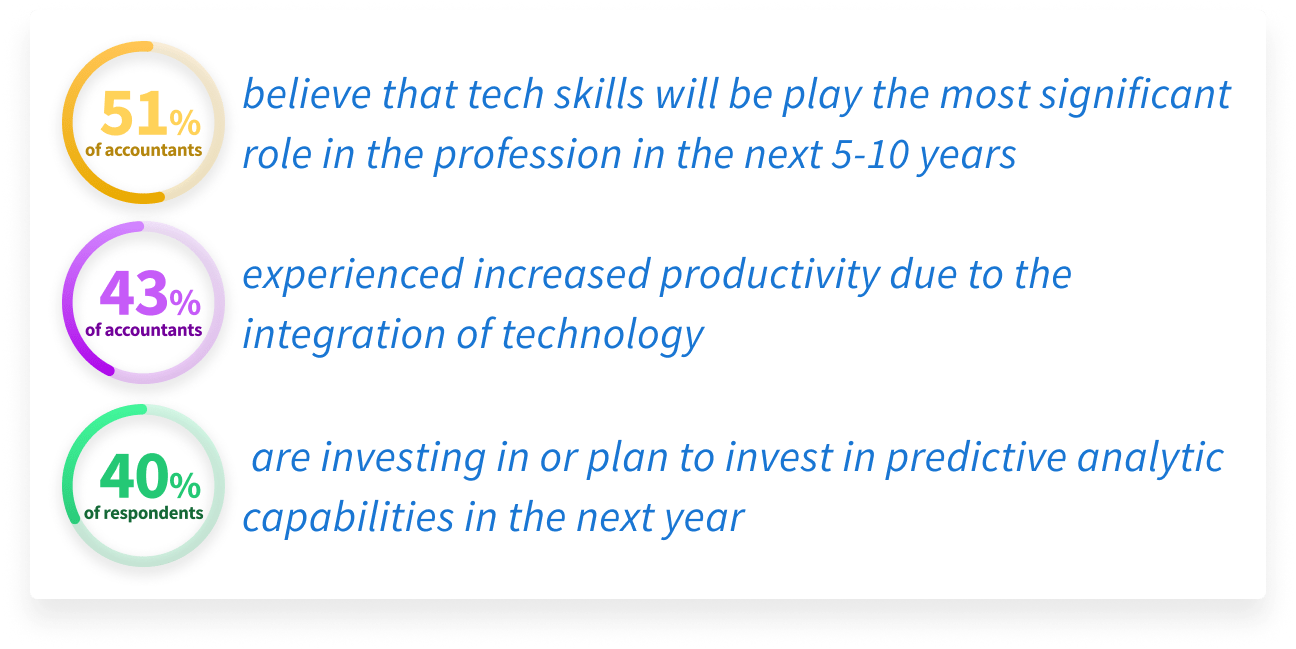
More than 300,000 accountants in the US have quit their jobs since 2020, according to a recent article in The Wall Street Journal. This staggering decline in the number of accounting professionals has left many firms struggling to fill empty roles.
Why are so many accountants leaving the field? This article will delve into the reasons for the mass exodus and provide insights into how to adapt to the changing landscape. It’s time to take a hard look at building a more sustainable future for accounting careers.
What caused the shortage of accountants
The causes are complex, ranging from increased burnout to misalignment with the values of the younger generations. Together, these dynamics have created a perfect storm of dissatisfaction, resulting in a shortage of accountants at a time when demand remains high. Let’s explore each of these key factors in more detail to gain a fuller understanding.
The burnout epidemic
Accountants often face immense pressure to deliver flawless work under rigid time constraints. Ensuring the accuracy of financial reporting, preparing tax returns and monitoring for discrepancies requires focus and persistence.
And forget about the 9-5 schedule during the busy season, when accountants log long night and weekend hours just to keep up with client deliverables and internal tasks – all of which require meticulous attention. A study by FloQast, an operational accounting platform, found that 99% of accountants experienced burnout. Fifty percent experienced moderate levels of burnout, while a quarter said they felt high or medium-high levels.

With intense workloads and a lack of separation between work and personal life, accountants may struggle to manage stress, which can lead to exhaustion and burnout. It’s a telltale sign when, according to FloQast survey results, more than 80% of accountants say that at least one month last year, the monthly close sabotaged their personal lives. This constant pressure contributes heavily to accountants seeking alternate career paths where the lifestyle may be more sustainable.
An evolving work-life balance
The pervasive presence of work in the home and on the go, enabled by digital tools, has created an “always on” environment. Without a clear line between work and home, accountants end up overworking as they try to support clients and employers.
Recent research conducted by the Association of Chartered Certified Accountants has revealed that a whopping 88% of accounting professionals are yearning for a better work-life balance. The frustration of never being fully present, neither at work nor at home, has prompted many to explore new careers where they feel empowered to better manage a work-life balance.
Technological disruption

Advances in artificial intelligence and automation are transforming the accounting industry. According to a Mordor Intelligence report, AI has been predicted to grow at a CAGR of 32.58%, reaching $11 billion in the next five years. AI-powered software increasingly automates tasks such as data entry, bookkeeping and report generation, reducing the need for manual effort.
This trend is concerning when it comes to job security. It may even push accountants to explore new career paths that offer more future-proof prospects. As automation takes over routine responsibilities, accountants are seeking more creative roles that leverage their uniquely human skills, including critical thinking, strategic planning and interpersonal communication. This shift highlights the need for the industry to adapt and create opportunities that align with the needs and aspirations of accountants.
Limited career growth
The hierarchical structure at most accounting firms may also place constraints on professional growth. As with other industries, leadership roles are limited at the top. According to research conducted by the Institute of Chartered Accountants in England and Wales, the cost-of-living crisis is limiting workplace mobility. One in five working accountants say their job progression is being negatively affected, and more than a quarter believe that there are fewer opportunities due to economic conditions.
Without a transparent pathway to promotion, accountants become frustrated and start looking elsewhere for growth potential. They seek a fresh start in entirely different industries. These tendencies contribute to a shortage of accountants.
Monotony and lack of fulfillment
Numerous essential accounting tasks, such as tax prep and monthly financial reporting, are highly repetitive and routine in nature. They leave little room for creativity, and require meticulous attention to detail. While accountants understand the significance of their role in ensuring accuracy, the monotony of this work can wear them down.
Craving more meaningful projects, creative problem solving and engaging work experience, many accountants leave the field to explore other career options where they can have a deeper sense of purpose and impact.
Pursuit of Entrepreneurship
Some accountants leverage their financial expertise to branch out into entrepreneurship, leaving traditional accounting employment behind. Recognizing their deep industry knowledge and skills, these specialists identify opportunities to fill gaps in the market by starting their own firms, such as niche consulting practices, outsourced CFO service companies and bookkeeping agencies.
The appeal of being one’s own boss, having the freedom to operate independently and indulging their creativity prompts transitions into small business ownership. Building their own brand and taking charge of their career trajectory motivates these accounting entrepreneurs to leave mainstream jobs behind in pursuit of something better aligned with their ambitions.
Shifting Professional Values
Many accountants today prioritize finding purpose, creativity, innovation and social impact in their work. They care deeply about personal growth, learning new skills, and having an emotionally rewarding career. However, some traditional accounting jobs centered heavily around analysis, compliance, reporting and keeping the books balanced may not always fulfill these values.
When their accounting roles focus solely on technical tasks without meaning or change, misalignment happens. Seeking out more dynamic work cultures, younger generations of accountants change careers, creating a talent shortage in the accounting industry.
Diversification of Skill Sets
The transferable skills of accountants extend far beyond debits and credits. Leveraging capabilities such as financial analysis, communication, project management, strategic thinking and attention to detail, accountants offer tremendous value far beyond traditional accounting roles.
Recognizing that, many accountants change roles or careers to apply their strengths in new contexts. The broadly applicable nature of accountants’ capabilities prompts exploration into a multitude of professional services and corporate roles beyond pure accounting. Fields such as consulting, human resources, operations and finance may be a reasonable fit.
Tips for accountants to thrive during industry changes
The accounting industry is undoubtedly experiencing seismic shifts. As automation transforms workflows and workplace expectations are being reshaped, accountants at all levels face the need to adapt. By taking these proactive steps, you can future-proof your career:
Embrace Technology as an Ally

To gain competitiveness in the marketplace, invest in acing new accounting software, data analytics programs and productivity tools. Approach automation as an opportunity to advance your skills rather than a threat. According to Sage research, technological expertise can directly impact performance. In the US, more than half of accountants believe that technology skills will play the most significant role in shaping the accounting profession over the next 5-10 years. Furthermore, 43% of respondents have already experienced increased productivity due to the integration of technology. Investing time in mastering the latest technology clearly pays dividends.
Commit to Continuous Learning
Seek out training programs, certifications, conferences and other opportunities to sharpen your skills. Prioritize skills that are in high demand, such as data analysis, critical thinking and strategic advisory services. Remain agile and flexible as the industry evolves rapidly.
Diversify Your Expertise
Look beyond your technical expertise as an accountant. Consider developing complementary business management skills as well – according to Sage, a software provider for building and managing businesses, one-third of employers believe that candidates should have broader capabilities including leadership skills, project management and independent decision-making. Additionally, more than half of respondents believe candidates should build financial advisory skills. Expand your capabilities to provide strategic guidance on financial planning, cash flow management, investments and other needs of clients.
Prioritize Networks and Collaboration
Actively engaging with professional accounting associations and attending conferences provides valuable opportunities to connect to other professionals, as well as an opportunity to familiarize yourself with best practices and find potential collaborations. Seek out opportunities to regularly communicate with your peers to exchange insights, ideas and knowledge that can be applied to your role. Staying plugged into the accounting community will help you keep your skills sharp. Check out the top US accounting conferences in 2024 that you will not want to miss.
Cultivate Adaptability and Critical Thinking
Soft skills such as flexibility, analytical thinking and problem-solving will become increasingly important as the industry continues to develop. Keep an open mind to new processes and systems. Hone your analytical abilities to quickly evaluate and understand new approaches so you can integrate them into your work seamlessly. It is important to stay intellectually agile and embrace new technology and the ever-changing workplace.
Seek Continuous Feedback
Consistently asking for constructive feedback from managers and clients provides insights into your current strengths and areas for improvement. Use this information to fuel your personal and professional development. Proactively requesting input from your employer rather than waiting for formal review shows engagement. Turn feedback into actionable goals for growth.
Make Wellness a Priority
Working extended hours or under high pressure can negatively impact health and well-being. Make self-care and stress management a priority by taking breaks, utilizing vacation time, and establishing work boundaries. Taking care of your physical and mental health enhances your ability to manage workplace demands in a high-performing yet sustainable way.
By taking proactive steps, accountants can build adaptability in the face of change and remain integral assets to employers.
Conclusion
The accounting landscape is undeniably shifting, with practitioners drawn to new opportunities outside the field. Demanding workloads and a lack of work-life balance result in pervasive burnout. Meanwhile, concerns about career growth prospects and job security in the face of automation and AI force many to question their future.
This complex landscape underscores the need for the accounting industry to evolve. Addressing ingrained issues around intense work environments, limited advancement, lack of fulfillment and lagging adaptation to technology is critical for retaining talent.
The time has come for bold conversations and innovative solutions. While the path forward holds many challenges, by embracing change, cultivating versatility, and prioritizing well-being, accountants can take charge of their career trajectories. Only by working together can employers and accountants create an industry where professionals can thrive for the long-term.

Thank you! The eBook has been sent to your email. Enjoy your copy.
There was an error processing your request. Please try again later.
Looking to boost your firm's profitability and efficiency?
Download our eBook to get the answers



